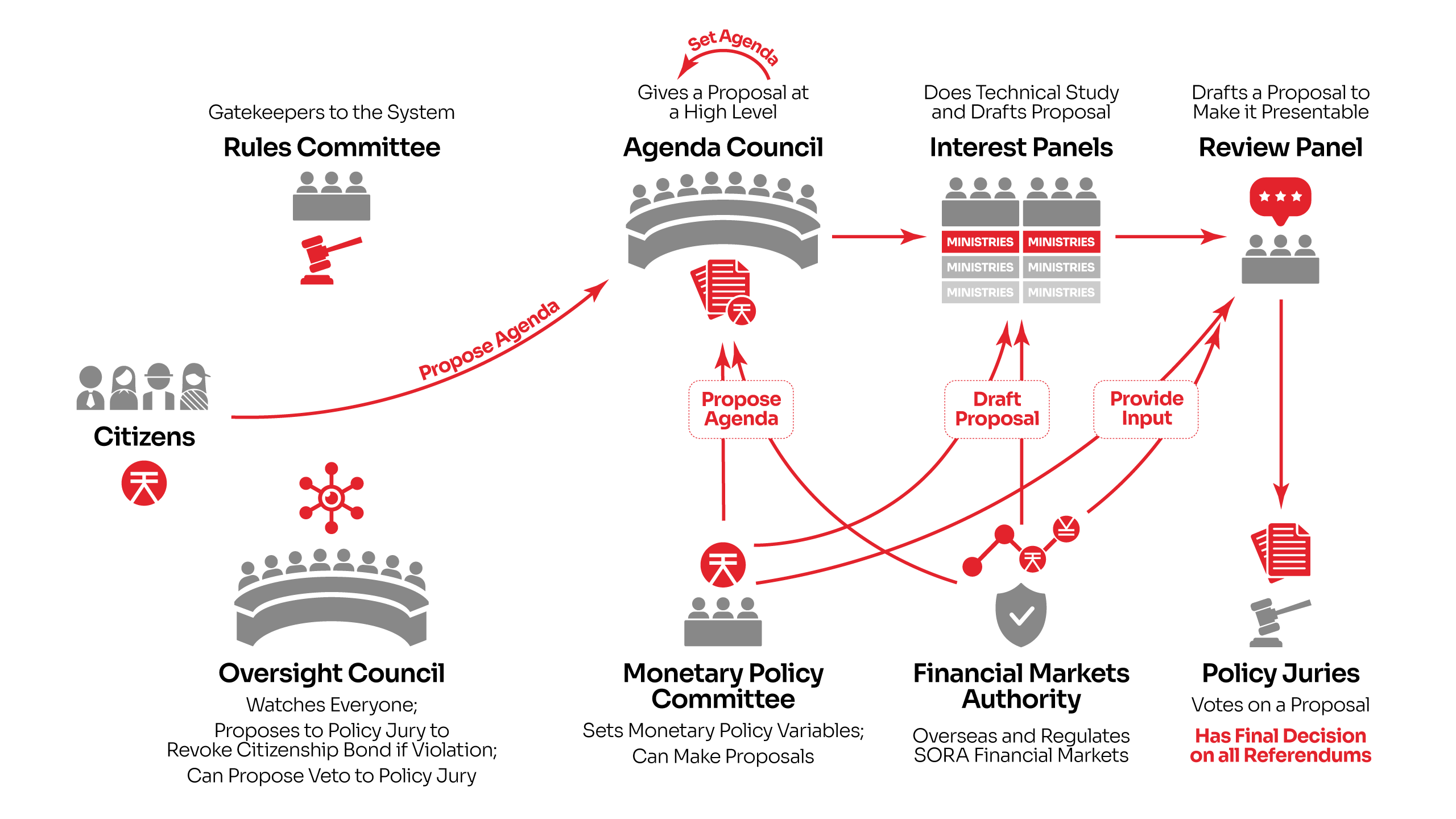 I have started assembling the top twelve minds for the creation of Web 3.0. This was written by one of the twelve.
I have started assembling the top twelve minds for the creation of Web 3.0. This was written by one of the twelve.
The SORA Parliament
Sora XOR
Multi-body sortition allows for collusion- and censorship-resistant governance
Unlike many other blockchain networks and societies that use token voting, SORA will utilize multi-body sortition in order to govern the SORA blockchain network and use of the SORA funds in a decentralized way
In the SORA Parliament, no single body or committee can both propose and decide something; clear separation of powers allows for careful review and avoids self-selection
Ordo Ab Chao
For millennia, human societies have organized into many forms of governance. In ancient Athens, democracy evolved over a period of 200 years and improved continuously over that time. Modern democratic systems, however, ignore many of the successful principles of Athenian democracy and have mostly degenerated to easily controllable popularity contests, using weaponized social media and control over news sources. Given the undeniable trend that citizens of countries across the world are increasingly unhappy with their governments, designing a better system for world governance seems timely.

Many blockchain communities have some rudimentary form of governance using token voting or governance tokens. Having a token to vote, however, implies a plutocracy, which is generally not considered an equitable form of governance. Many projects also have a track record of abuse. Therefore, for the SORA Parliament we won’t use naïve token voting, but instead will have a Parliamentary system that has multiple bodies with clear separation of powers and where the members are chosen randomly.
Governance by Multi-Body Sortition
Democracy of course can take many forms. In ancient Athens, the system evolved over time, but was generally grounded on 3 concepts:
- Isonomia: the principle that everyone who is a citizen has political equality
- Isegoria: the right of all citizens to speak and contribute
- Sortition: randomly choosing groups of citizens to make decisions
Plato was quite negative on Athenian democracy, and indeed there are many famous examples of shortcomings, such as the execution of Socrates, the fine of Pericles, or the ostracization of Aristedes. In Athens, democracy often was controlled by jealous demagogues who would manipulate the masses to hammer down anyone that stood out either through wealth or exceptional talent.
However, Athenian democracy also had many strong points. It allowed many diverse people to participate in the decision making process, and this became the inspirational basis for the Roman Senate. Many people describe Athens as a “direct democracy” referring to the assembly at which up to 20% of citizens might attend. But critical decisions were also made by randomly selected bodies of citizens rather than the assembly itself. The random Council of 500 set the agenda for the assembly, randomly selected legislative panels adopted new laws, and randomly selected citizen courts could overrule the assembly.
Bouricius, who we received positive feedback from about our design for the SORA Parliament, in particular has influentially been a proponent of incorporating classical Athenian democratic principles into contemporary political systems. Based in large part on his paper and feedback, we designed the SORA Parliament as a multi-body parliament that has clear separation between propositioning, decision making, and rule making. There is no president or prime minister in this system, rather the rules of the system itself are the leader and all participants collaborate together as equal peers, making and reviewing proposals.

The proposal pipeline made up of multiple bodies in the SORA Parliament.
The SORA Parliament is made of the following bodies:
Rules Committee: Proposes rules about what kind of proposals can be given to an Agenda Council. Also proposes other rules governing the system. All rule proposals need to be ratified by a Policy Jury for it to take effect.
Agenda Council: Takes a proposal and, if it is within the boundaries set by the Rules Committee, votes on whether or not to accept a proposal for further study.
Interest Panels: For each proposal accepted by the Agenda Council, one or more volunteers can come forth to form Interest Panels to study a proposal. If there are multiple volunteers, as many Interest Panels can be formed as there are interested participants and they can all put together reports studying a proposal. Additionally, ministries that focus on specific topics should participate in Interest Panels, providing their expertise.
Review Panel: Collates reports from the Interest Panel(s) into a proposal presentable to a Policy Jury. The proposal should clearly list pros and cons for a proposal in a neutral way.
Policy Juries: Each proposal will be decided by a randomly selected, one-time panel that is called a Policy Jury. All rule changes, proposals, citizenship revocations, and other punishments can only be ratified by a Policy Jury.
Monetary Policy Committee: Sets monetary policy variables and can make new proposals.
Financial Markets Authority: Regulator of financial markets that choose to be regulated by the FMA. Regulator of Polkaswap that provides governance facilities for the DEX.
Oversight Council: Watches all participants in the SORA Parliament and looks for violations of rules. If punishment of some entity is required, it proposes punishment to a Policy Jury for the final decision.
Our design puts an emphasis on eliminating self-selection and control by factions, as a citizen can only be involved with one of the governance bodies at a time and members are chosen by sortition.
Governance by Anons for Anons
Blockchain-based societies are by their nature pseudoanonymous. Therefore, traditional concepts of identity, such as national ID cards, cannot be used to prevent Sybil attacks on the SORA Parliament, so another method must be used. Similar to Proof-of-Stake systems, to become a citizen in the SORA Parliament, a bond of XOR must be posted. Though not decided, approximately 150 XOR are likely to be the size for a citizenship bond. This bond can be slashed if the citizen is convicted by a Policy Jury of breaking rules.
By making the cost to become a citizen non-trivial and also using sortition to choose citizens for decision-making functions, dominance by any entity of the entire process becomes statistically unlikely.
The SORA Citizen
All citizens have equal chance of being selected, have equal voting power, and equal rewards for participation. To compensate citizens for their time, 1% of the funds that are allocatable to projects for productive uses shall be distributed to citizens.
Citizens will be chosen to the SORA Parliament by random selection (sortition). They will be able to reject if they cannot commit, but it is better to allow citizens to reject than to wait for volunteers, because some demographic groups and cultures are more passive and would be underrepresented if action was required.
Being a SORA citizen is a great honor and a great responsibility. In addition to the citizenship bond, some positions in the SORA Parliament may require verifiable credentials attesting to certain qualifications. This will ensure that the SORA Parliament will be efficiently run and delivers high quality and professional solutions.
The main task of the SORA Parliament is to allocate newly minted XOR to productive projects. When the SORA Parliament allocates capital, it is exercising the most powerful force there is: creation of new purchasing power. By combining decentralized governance and decentralized allocation of capital, the SORA Parliament can create a digital world government that can work to make our world better, without intruding on individual liberties.
The Role of Experts
In addition to citizens, full-time teams of experts are likely needed to work in the ministries of the SORA Parliament in order to perform analyses and simulations, as well as propose long-term strategic policies. Including domain experts into a democratic process, without having non-democratic domination by a technocratic elite is a very difficult balance to accomplish. After consultation with Bouricius, we decided on using sortition to form a nominating/recruiting body that would hire professional experts to work in the ministries, in support of the SORA Parliament. These staff could then also be removed, if proposed and ratified by a Policy Jury.
Supranational Global Governance
Because SORA (XOR) aims to be a supranational, global unit of account, store of value, and medium of exchange, the SORA Parliament also needs to be global, so as to avoid a Triffin dilemma. Thus, the end goal of all of this is to create not only a global new economic order, but also a supranational governance system that can go along with it. Democratic governance and capital allocation combined together will be a powerful force that can be used to unite people across the globe into productive collaboration.
About SORA NEO Network, Polkaswap, and Fearless
SORA NEO (New Economic Order) is a new economic system aimed at creating a supranational, decentralized central bank (DCB) with built-in tools for decentralized finance (DeFi). The SORA network implements a new way of parachain architecture on Polkadot and Kusama network, with the capability to bridge external blockchains (like Ethereum) to the Polkadot ecosystem. One of the DeFi applications that will run on the SORA network is Polkaswap, a non custodial liquidity aggregator, cross-chain AMM DEX designed uniquely for the Polkadot ecosystem with boundless liquidity through one of a kind Aggregate Liquidity Technology (ALT) with the security and convenience of a DEX.
Fearless Wallet is a mobile wallet designed for the decentralized future on the Kusama and Polkadot networks, with support for iOS and Android platforms. An awesome user experience, fast performance, and secure storage for your accounts. The Fearless wallet will integrate Polkaswap for easy, decentralized swaps of assets.
Connect with us:
- SORA community: Twitter | Telegram | Announcements Channel
- Polkaswap community: Twitter | Telegram | Announcement Channel
- Fearless Wallet community: Twitter | Telegram
RELATED:
Smart Nation Vision – By Invitation



